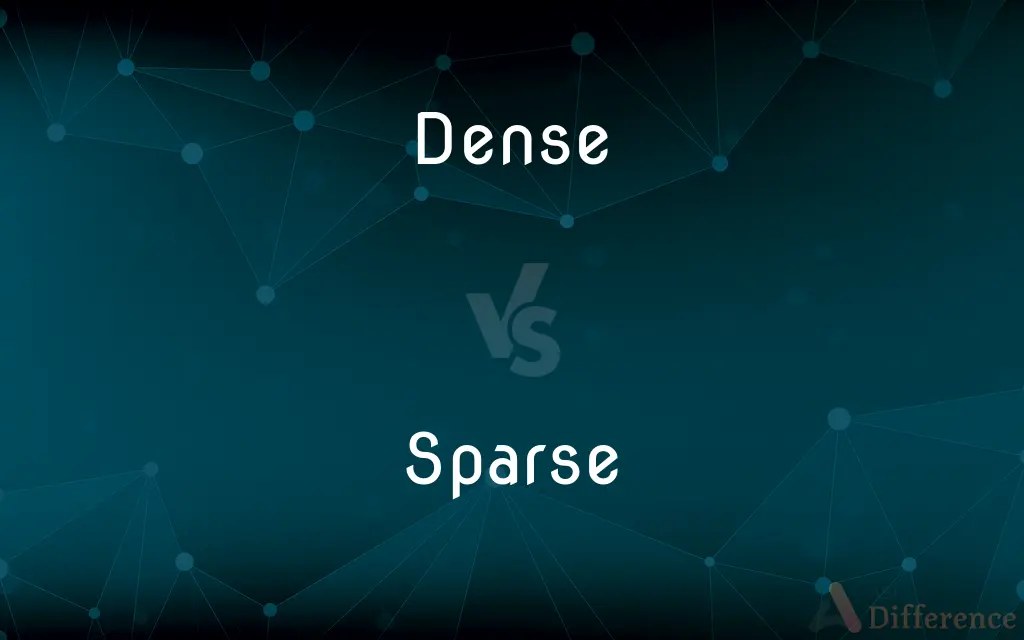Dense vs. Sparse — What's the Difference?
By Tayyaba Rehman & Urooj Arif — Updated on March 12, 2024
Dense involves closely packed elements, while sparse refers to elements spread out with lots of space in between.

Difference Between Dense and Sparse
Table of Contents
ADVERTISEMENT
Key Differences
Dense arrays or matrices have most of their elements as non-zero values, indicating a high level of data population. Sparse arrays or matrices, in contrast, are characterized by a majority of zero or null values, showing a low level of data population.
In the context of data storage, dense structures consume more storage space as they store all elements, including zeros. Sparse structures, however, use storage techniques that only record non-zero elements, leading to more efficient use of space.
Computationally, operations on dense matrices are typically straightforward but can be computationally intensive due to the large number of elements involved. Sparse matrices, on the other hand, may require specialized algorithms to efficiently navigate and operate on the non-zero elements, potentially reducing computational load.
The choice between dense and sparse representations depends on the nature of the data and the specific requirements of the application. Dense formats are preferred when the data is uniformly distributed without many zeros, while sparse formats are ideal for data with many zeros, as is common in certain scientific computations, signal processing, and machine learning tasks.
In practical applications, converting a dataset from dense to sparse format (or vice versa) can significantly impact performance and storage requirements. This conversion is often considered in data preprocessing to optimize processing speed and resource usage.
ADVERTISEMENT
Comparison Chart
Element Population
High, mostly non-zero values
Low, mostly zero values
Storage Efficiency
Lower, stores all elements
Higher, stores only non-zero elements
Computational Load
Can be high due to more elements
Potentially lower with specialized algorithms
Preferred Usage
Uniformly distributed data
Data with many zeros
Conversion Impact
-
Can optimize processing and storage
Compare with Definitions
Dense
Requires more storage space.
Storing a dense array consumes more memory.
Sparse
Widely spaced elements.
A sparse matrix is mostly filled with zeros.
Dense
Uniform data distribution.
Image data is often stored in dense format due to its uniformity.
Sparse
Can optimize performance.
Converting to sparse format can greatly reduce storage needs and speed up processing.
Dense
Less efficient for sparse data.
Using dense storage for sparse data is inefficient.
Sparse
Requires specialized algorithms.
Sparse data structures often need unique computational approaches.
Dense
Closely packed elements.
A dense matrix has few zero values.
Sparse
Efficient storage for zeros.
Sparse representations save space by not storing zero values.
Dense
Higher computational load.
Computations on dense data structures can be resource-intensive.
Sparse
Ideal for non-uniform data.
Sparse formats are preferred for data with many gaps.
Dense
Closely compacted in substance
As the storm cleared, a dense fog came down
Sparse
Sparse is a computer software tool designed to find possible coding faults in the Linux kernel. Unlike other such tools, this static analysis tool was initially designed to only flag constructs that were likely to be of interest to kernel developers, such as the mixing of pointers to user and kernel address spaces.
Dense
(of a person) stupid
Am I being dense? I don't quite understand
Sparse
Occurring, growing, or settled at widely spaced intervals; not thick or dense.
Dense
(of a text) hard to understand because of its complexity of ideas
A dark, dense novel
Sparse
Having widely spaced intervals.
A sparse array, index, or matrix
Dense
Having relatively high density.
Sparse
Not dense; meager; scanty
Dense
Crowded closely together; compact
A dense population.
Sparse
(maths) Having few nonzero elements
Dense
Hard to penetrate; thick
A dense jungle.
Sparse
(obsolete) To disperse, to scatter.
Dense
Permitting little light to pass through, because of compactness of matter
Dense glass.
A dense fog.
Sparse
Thinly scattered; set or planted here and there; not being dense or close together; as, a sparse population.
Dense
Opaque, with good contrast between light and dark areas. Used of a photographic negative.
Sparse
Placed irregularly and distantly; scattered; - applied to branches, leaves, peduncles, and the like.
Dense
Difficult to understand because of complexity or obscurity
A dense novel.
Sparse
To scatter; to disperse.
Dense
Slow to apprehend; thickheaded.
Sparse
Not dense;
A thin beard
Trees were sparse
Dense
Having relatively high density.
Dense
Compact; crowded together.
Dense
Thick; difficult to penetrate.
Dense
Opaque; allowing little light to pass through.
Dense
Obscure, or difficult to understand.
Dense
Being a subset of a topological space that approximates the space well. See the Wikipedia article on dense sets for a mathematical definition.
Dense
Slow to comprehend; of low intelligence.ADJ7
Dense
A thicket.
Dense
Having the constituent parts massed or crowded together; close; compact; thick; containing much matter in a small space; heavy; opaque; as, a dense crowd; a dense forest; a dense fog.
All sorts of bodies, firm and fluid, dense and rare.
To replace the cloudy barrier dense.
Dense
Stupid; gross; crass; as, dense ignorance.
Dense
Permitting little if any light to pass through because of denseness of matter;
Dense smoke
Heavy fog
Impenetrable gloom
Dense
Closely crowded together;
A compact shopping center
A dense population
Thick crowds
Dense
Hard to pass through because of dense growth;
Dense vegetation
Thick woods
Dense
Having high relative density or specific gravity;
Dense as lead
Dense
Slow to learn or understand; lacking intellectual acuity;
So dense he never understands anything I say to him
Never met anyone quite so dim
Although dull at classical learning, at mathematics he was uncommonly quick
Dumb officials make some really dumb decisions
He was either normally stupid or being deliberately obtuse
Worked with the slow students
Common Curiosities
How does storage efficiency differ between dense and sparse structures?
Dense structures are less storage-efficient as they store all elements, including zeros, whereas sparse structures only store non-zero elements, saving space.
Why would you use a sparse matrix?
Sparse matrices are used when the data contains a high proportion of zero values, making them more storage and computation efficient.
Why is the choice between dense and sparse important in machine learning?
In machine learning, choosing between dense and sparse representations can significantly impact model training speed and memory usage, especially with large datasets.
Can dense and sparse formats affect computational speed?
Yes, dense formats can slow down computations due to the larger number of elements to process, while sparse formats can speed up computations by focusing on the non-zero elements.
What makes a matrix dense?
A matrix is dense if most of its elements are non-zero, indicating little to no empty space between the data points.
How does the representation of zeros differ in dense and sparse formats?
Dense formats explicitly store zeros as part of the structure, while sparse formats typically omit zeros, recording only non-zero values.
What impact does using sparse data structures have on memory?
Sparse data structures significantly reduce memory usage by only storing necessary, non-zero information.
Can all data types be represented in both dense and sparse formats?
While many types of data can be represented in both formats, the choice depends on the data's characteristics and the efficiency of operations.
How do you convert dense data to sparse?
Converting dense to sparse involves identifying and eliminating zero values, only storing the location and value of non-zero elements.
Are there specific algorithms for sparse data processing?
Yes, there are specialized algorithms designed to efficiently process sparse data by exploiting the gaps in the dataset.
Share Your Discovery

Previous Comparison
Action vs. Behavior
Next Comparison
Unique vs. UnusualAuthor Spotlight
Written by
Tayyaba RehmanTayyaba Rehman is a distinguished writer, currently serving as a primary contributor to askdifference.com. As a researcher in semantics and etymology, Tayyaba's passion for the complexity of languages and their distinctions has found a perfect home on the platform. Tayyaba delves into the intricacies of language, distinguishing between commonly confused words and phrases, thereby providing clarity for readers worldwide.
Co-written by
Urooj ArifUrooj is a skilled content writer at Ask Difference, known for her exceptional ability to simplify complex topics into engaging and informative content. With a passion for research and a flair for clear, concise writing, she consistently delivers articles that resonate with our diverse audience.















































